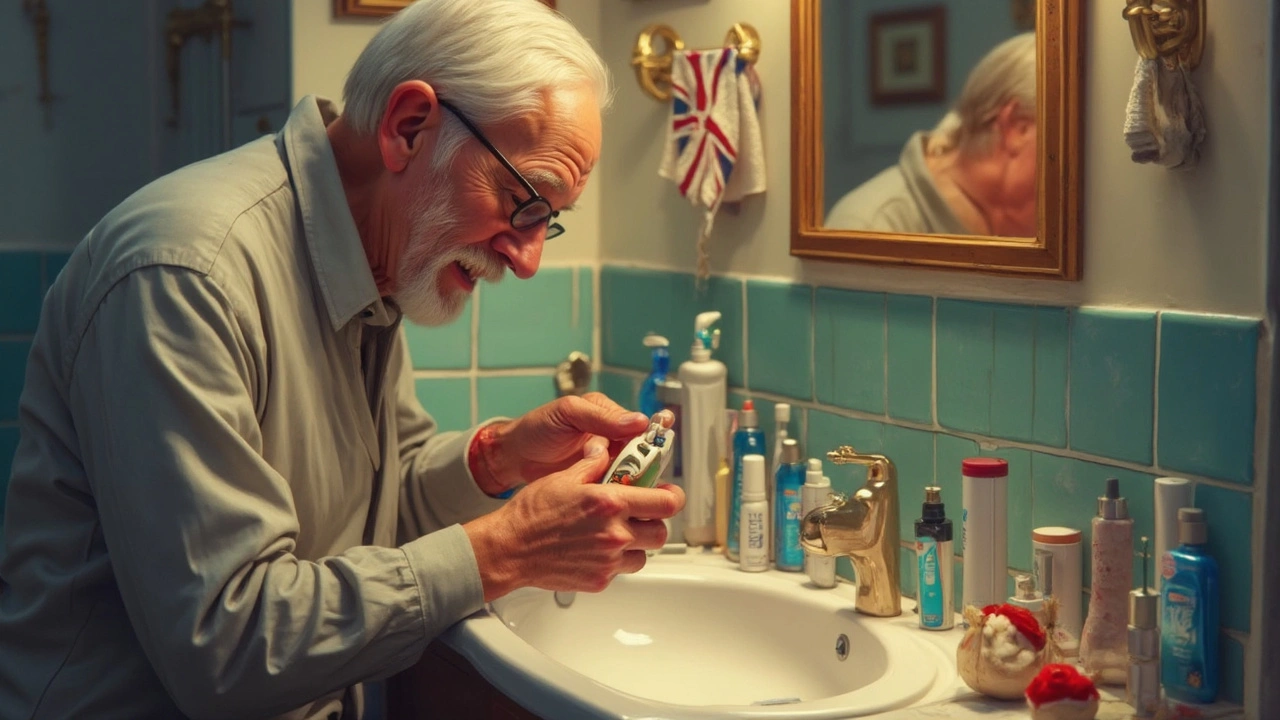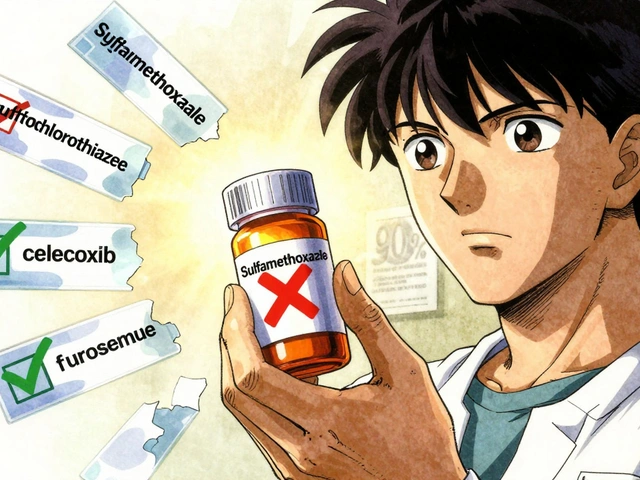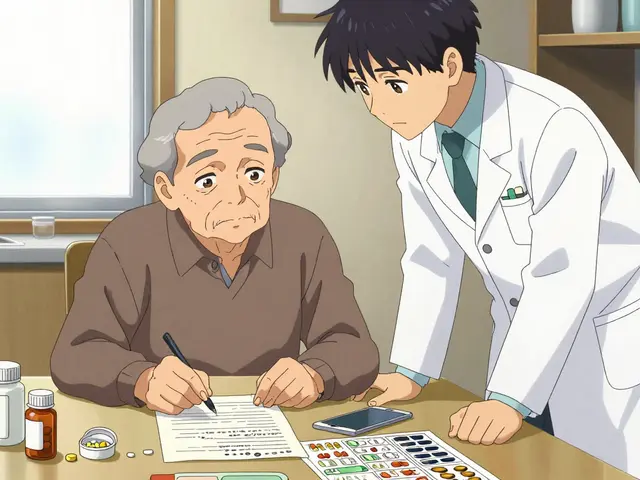Dry mouth can hit hard when you're on carbidopa-levodopa-entacapone, and it's more than just uncomfortable—it’s a free pass for cavities and gum disease to move in. You might notice your mouth feels sticky or like you can’t wash down food no matter how much you drink. That dry feeling isn’t just annoying. Without enough spit, your teeth lose their natural defender against acid and germs.
Brushing and flossing might suddenly feel like a workout, especially if tremors, stiffness, or slow movements make gripping a toothbrush tricky. That means plaque and food bits can build up where you least want them. Medication can even change how your gums respond, sometimes making them swollen, red, or sore—so things can slide downhill fast if you’re not careful.
The upside? There are real ways to stay one step ahead. Small changes, like switching to an electric toothbrush or keeping water nearby, really do help. Don’t wait for tooth pain to show up; getting ahead of the little stuff now saves you way bigger hassles down the road.
- Why This Medication Affects Your Teeth
- Spotting Dental Problems Early
- Simple Tricks for Easier Oral Care
- Working Together: Dentists, Doctors, and You
Why This Medication Affects Your Teeth
If you’re taking carbidopa-levodopa-entacapone for Parkinson's, your dentist probably isn’t the first person you’d think to talk to. But these meds mess with your mouth in ways most people don't realize.
First off, they commonly cause dry mouth. You need saliva, not just for comfort, but because it clears away food, fights bacteria, and protects your teeth from decay. When your meds slow down saliva, leftovers stick around, acids go up, and the protective shield is gone. That’s how cavities sneak up—quick.
Some folks also notice changes in taste, or extra jaw movements that wear down teeth. The medication doesn’t attack your teeth itself, but the way it messes with your mouth makes things worse. Plus, medication side effects can make it harder to keep up with proper oral care—for example, tremors or muscle stiffness can turn a quick brushing job into a real challenge. This means plaque, tartar, and gum swelling can get out of hand.
Here’s a quick look at some common oral side effects associated with carbidopa-levodopa-entacapone:
- Dry mouth (xerostomia)
- Difficulty swallowing or talking
- Jaw clenching or involuntary mouth movements
- Glossitis (inflamed tongue)
- Cavities and gum disease risk shoots up
If you’re wondering how common these issues are, a review in 2021 found that up to 50% of people with Parkinson’s on these meds reported dry mouth as a daily problem. That’s a coin toss. So the struggle is real, not rare.
The big takeaway? The connection between Parkinson's meds and dental health isn’t just about what happens in your brain. Your mouth is right in the crosshairs, too.
Spotting Dental Problems Early
When you take carbidopa-levodopa-entacapone for Parkinson's, weird things can pop up in your mouth before you know it. Catching these dental problems early can save you some serious pain—and a lot of money at the dentist. But how do you know what to look for?
- Dry mouth signs: If your tongue feels sticky, you get sores at the corners of your mouth, or even food tastes off, take note. Even mild dry mouth makes it easier for cavities to form.
- Gum changes: Watch for swollen or bleeding gums. Spot blood on your toothbrush? That’s a red flag your gums aren’t happy, maybe because of both Parkinson's and your medication.
- New or worsening tooth pain: Sensitivity to cold, hot, or sweet stuff isn’t just annoying—it can signal the start of decay or a gum problem.
- Bad breath that sticks around: If brushing and mouthwash don’t help, dry mouth and plaque might be building up more than usual.
- Difficulty chewing or swallowing: Not only a Parkinson's thing—this can happen if teeth or gums are acting up. It’s worth checking out.
Here’s an easy way to keep track of possible dental trouble:
| Symptom | What It Could Mean |
|---|---|
| Constant dry feeling | Reduced saliva, risk for cavities |
| Bleeding gums | Gum disease (gingivitis or worse) |
| Loose teeth | Advanced gum disease |
| Sores or patches | Possible infection or irritation |
Try to check your mouth once a week with a handheld mirror under good light. If something looks or feels off and it lasts more than a couple days, don’t wait—call your dentist. Most dental issues start out small and fixable, especially for people on carbidopa-levodopa-entacapone. The quicker you spot things, the easier and cheaper it is to fix them.

Simple Tricks for Easier Oral Care
If you’re taking carbidopa-levodopa-entacapone for Parkinson's, keeping up with daily dental care can feel like a tall order. But some practical hacks can take pressure off both your teeth and your hands.
- Switch to an electric toothbrush. If holding a regular toothbrush is a battle, pick up a power brush with a chunky, non-slip handle. Some models even have timers to keep you honest.
- Try a flossing tool. Floss picks, water flossers, or soft brushes can do a lot of heavy lifting—no more finger acrobatics just to clean between teeth.
- Keep water close by. Because this medication often dries your mouth, sip water during and after meals. A dry mouth makes decay a real risk.
- Pick sugar-free gum or lozenges. These can help jumpstart your saliva, which naturally protects your teeth from bacteria.
- Ask your dentist about fluoride products. Stronger fluoride toothpaste or mouth rinses are shown to reduce cavities, especially if your mouth is extra dry.
If motivation is tricky on tough days, try brushing right after meals while you’re still at the table—less chance you’ll forget later. And if you notice soreness, burns, or cuts in your mouth, tell your dental team. Open sores can show up with these meds and shouldn’t be ignored.
| Oral Care Tool | Benefit |
|---|---|
| Electric Toothbrush | Less effort, better plaque removal |
| Floss Picks | Easier grip, thorough cleaning |
| Water Flosser | Gentle, no sore fingers |
| Fluoride Toothpaste | Extra cavity protection |
Don’t be afraid to ask for help if hand stiffness or tremors make things rough—sometimes a loved one or caregiver can lend a hand, and that’s totally okay. The big thing here is not letting small struggles pile up; a few smart tweaks to your routine can keep your dental health on track, even if Parkinson’s throws you the odd curveball.
Working Together: Dentists, Doctors, and You
If you’re taking carbidopa-levodopa-entacapone for Parkinson’s, keeping your dental team in the loop can make a big difference. These meds don’t just affect your movement—they can really shake up dental care routines, too. Your dentist needs to know exactly what you’re taking and how your symptoms affect day-to-day stuff like brushing or sitting still in the chair.
Don’t just mention ‘I have Parkinson’s’—share what time you take your pills, how long it takes before you feel your best, and what side effects show up. Some dentists suggest booking appointments during your “on” times, when you’ve got the most control over your movements. That small change makes cleanings and procedures a whole lot easier and more comfortable.
- Give your dentist a full list of your meds, especially carbidopa-levodopa-entacapone and anything else you regularly take.
- Ask your doctor if any drug adjustments could help with dry mouth or drooling. Sometimes a change in timing or dose helps.
- Check if you need extra fluoride, prescription rinses, or saliva substitutes to keep your teeth safe.
Your doctor and dentist can actually work as a team here. There’s solid research showing that people with Parkinson’s who see their dentist regularly have fewer dental emergencies and less pain. In a small study out of a movement disorder center last year, people who visited the dentist twice a year needed 40% fewer urgent dental fixes than those who just came in when things hurt.
| Dental Visits/Year | Urgent Dental Procedures Needed (%) |
|---|---|
| 2 or more | 12% |
| Only when in pain | 20% |
And hey, tell your dental team about any new symptoms—even if they seem embarrassing. Extra spit, dry tongue, mouth sores, or biting your cheek more often are all things they need to know to help you manage. You’re all working toward the same goal: keeping your mouth healthy so you can eat, talk, and keep smiling with confidence.





Rose Macaulay
April 29, 2025 AT 16:08I just started this med last month and my mouth has been so dry it feels like I’ve been chewing sand. I didn’t even realize how bad it was until I bit my cheek twice in one day. Started sipping water constantly and using that fluoride rinse the dentist gave me-huge difference. Still a pain to brush, but at least my teeth aren’t screaming at me anymore.
Sam Tyler
April 29, 2025 AT 17:56For anyone on this combo, let me tell you-dry mouth isn’t just an annoyance, it’s a silent dental time bomb. I’ve had Parkinson’s for 12 years and was on this med for 8. By year 5, I had three crowns and a root canal because I thought ‘I brush, so I’m fine.’ I wasn’t. Saliva is your body’s natural toothpaste, and when meds shut it down, plaque doesn’t just sit there-it multiplies like rabbits. I switched to an electric toothbrush with a pressure sensor, started using xylitol gum after every meal, and now I rinse with alcohol-free fluoride mouthwash before bed. Also, keep a humidifier in your bedroom. It’s not glamorous, but your teeth will thank you. And don’t wait for pain. If your tongue feels like parchment paper by noon, you’re already behind. Prevention isn’t optional here-it’s survival.
Michael Harris
April 30, 2025 AT 15:27Let’s be real-this whole ‘oral care hack’ thing is just corporate fluff wrapped in Parkinson’s pity. Dentists push fluoride because they get kickbacks. Electric toothbrushes? Overpriced toys. The real problem is that these meds are designed to wreck your nervous system, and nobody wants to admit it. You think sipping water helps? It’s a band-aid on a bullet wound. The only real solution is to stop taking this garbage and find a neurologist who actually cares about your quality of life instead of just ticking boxes. This isn’t ‘smart habits’-it’s damage control for a broken system.
Milind Caspar
April 30, 2025 AT 18:16There is a pattern here that is being deliberately obscured. The pharmaceutical industry has known for decades that levodopa derivatives cause xerostomia and alter oral microbiota. Yet, no public health campaign has been launched to warn patients. Why? Because dental complications are considered ‘secondary’-and secondary problems do not generate headlines or investor returns. Meanwhile, patients are sold ‘floss picks’ and ‘fluoride rinses’ as if they are solutions, when in fact, they are distractions from the core issue: the systemic toxicity of these drugs. The 50% dry mouth statistic? That’s not a coincidence-it’s a signature. And if your dentist doesn’t know this, they’re not your ally-they’re a cog in the machine.
Ellen Frida
May 1, 2025 AT 13:44i just wanted to say that i think we’re all just energy beings and our mouths are mirrors of our soul’s blockages… like when my tongue felt dry, i realized i wasn’t speaking my truth and that’s why my body made me pay? also, my cat licked my toothbrush once and now i feel like it’s blessed? 🌿✨